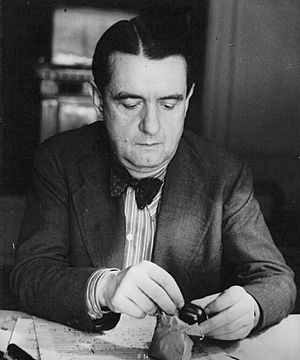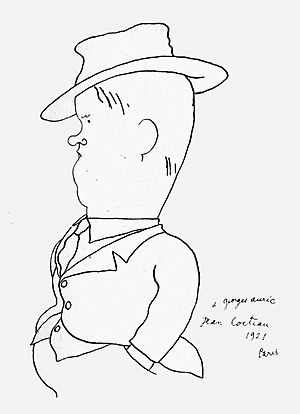Georges Auric facts for kids
Quick facts for kids
Georges Auric
|
|
|---|---|
 |
|
| Born | 15 February 1899 |
| Died | 23 July 1983 (aged 84) |
Georges Auric (born February 15, 1899 – died July 23, 1983) was a famous French composer. He was born in Lodève, France. Georges Auric was part of a special group of artists called Les Six. This group was friends with Jean Cocteau and Erik Satie. Even before he was 20, Auric had already written music for ballets and plays. He also became well-known for composing music for many movies.
Contents
Early Life and Music
Georges Auric started his music journey when he was very young. At just 14, he played a piano concert for the Société musicale indépendante. The next year, some of his own songs were performed by the Société Nationale de Musique.
While having early success, Auric also studied music. He went to the Conservatoire de Paris and learned composition from Vincent d'Indy and Albert Roussel. People saw him as a child genius in both composing and playing piano. Later, he became a student of Erik Satie.
In the 1910s and 1920s, Auric was a big part of the new, experimental music scene in Paris. He was greatly inspired by Jean Cocteau and the other composers in Les Six.
His Career as a Composer

Auric's first musical pieces were a way of reacting against the old, traditional music styles. Because of this, and his connection to Cocteau and Satie, a music critic named Henri Collet grouped Auric into Les Six. Auric was also good friends with the artist Jean Hugo.
Being part of Les Six led Auric to write music for poems and other texts. He created many songs and musicals. He also contributed a piece to a collection called L'Album des Six with the other five composers.
In 1921, Cocteau asked Auric to write music for his ballet, Les Mariés de la tour Eiffel. Auric didn't have much time, so he asked his friends in Les Six to help. All of them agreed, except for Louis Durey. During this time, he also wrote a short opera called Sous le masque (1927).
In 1927, Auric helped create music for a children's ballet called L'Éventail de Jeanne. Ten French composers worked together on this project. Later, in 1952, he joined another collaboration for orchestral music called La Guirlande de Campra.
Les Six was a casual group that didn't last long. But they became famous for going against the traditional music of their time. They liked to use humor and satire in their work. The group didn't like the serious styles of composers like Wagner and Debussy. Their music, including Auric's, showed the unique culture of Paris back then. They rejected international styles from Russian and German music. They also didn't like the impressionism and symbolism of Debussy.
Auric later became a composer who wrote music for everyone, not just a small group. This was influenced by Les Six, especially their use of popular music. Music from the circus or dance halls was important in their work. However, Les Six eventually went their separate ways, and Auric explored new paths in his art.
Music for Movies
After his early success as an experimental composer, Auric went through a change in the 1930s. He started writing music for films in 1930. His music for the movie À Nous la Liberté in 1931 was very popular.
While he was starting a successful career in film music, his other compositions changed. His Piano Sonata (1931) was not well-received. After that, he wrote very little for five years, including his first three film scores. He continued to work with Cocteau, composing music for Cocteau's film Le Sang d'un poète.
By 1935, Auric stopped focusing on music for a small, elite audience. He wanted to create music that appealed to more people. He joined groups and publications that supported left-wing ideas. These included the Association des Ecrivains et des Artistes Révolutionnaires (AEAR). He decided to compose in four main ways:
- Work with other artists who shared his political views.
- Write music in more styles to reach a bigger audience.
- Create music for younger people.
- Express his political ideas more directly in his music.
The movies Auric chose to score were influenced by these new beliefs and his old friendships. He worked with Jean Cocteau, his long-time friend from Les Six, on eleven films. He composed music for many movies in France, England, and America. One of his most famous scores is for the movie Moulin Rouge. The song from that movie, "Where Is Your Heart?", became very popular.
In 1962, he stopped writing for movies. He became the director of the Opéra National de Paris. Then he became chairman of SACEM, which is a French organization that protects the rights of composers. Auric continued to write classical chamber music, especially for wind instruments, until he passed away.
Auric also spent a lot of time writing music reviews. His reviews focused on promoting the ideas of Les Six and Cocteau, which they called esprit nouveau (new spirit). He often criticized composers like Debussy and Wagner. Auric and Les Six felt that these composers' music was not connected to real life. They preferred music that was more down-to-earth and popular.
His Personal Life
In the 1920s, Auric had criticized Erik Satie for joining the French Communist Party. However, in the 1930s, Auric himself became involved with several left-wing groups. He also wrote for communist newspapers like Marianne and Paris-Soir. The Association des Ecrivains et des Artistes Révolutionnaires (AEAR) aimed to bring together Soviet and French communist artists. They discussed how to share their ideas with the public. Through this group, Auric met many other artists and thinkers who shared his views. These ideas influenced his concert music and the movies he chose to score.
In 1930, Auric married the painter Eleanore Vilter. She passed away in 1982. Georges Auric died in Paris on July 23, 1983, at the age of 84. He was buried at Montparnasse Cemetery, next to his wife.
Selected Works
- Trois Interludes for piano and voice (1914)
- Huit Poèmes de Jean Cocteau for piano and voice (1918)
- Adieu, New-York! for piano (1919)
- Prélude for piano (1919)
- Les joues en feu for piano and voice (1920)
- Ouverture and Ritournelle from Les Mariés de la Tour Eiffel for orchestra (1920)
- Pastorales for piano (1920)
- Sonatine for piano (1922)
- Les Fâcheux (Ballet) (1923)
- Cinq Bagatelles for piano 4 hands (1925)
- Les Matelots (Ballet) (1925)
Selected Film Music
A more complete list is in the French Wikipedia article on Georges Auric .
- Le sang d’un poète (1930)
- À nous la liberté (1931)
- Lake of Ladies (1934)
- The Mysteries of Paris (1935)
- The Messenger (1937)
- The Alibi (1937)
- The Red Dancer (1937)
- The Lafarge Case (1938)
- His Uncle from Normandy (1939)
- The Beautiful Adventure (1942)
- The Murderer is Afraid at Night (1942)
- L'Éternel retour (1943)
- François Villon (1945)
- Farandole (1945)
- Dead of Night (1945)
- Beauty and the Beast (1946)
- Pastoral Symphony (1946)
- Hue and Cry (1947)
- The Seventh Door (1947)
- Desert Wedding (1948)
- To the Eyes of Memory (1948)
- Passport to Pimlico (1948)
- Ruy Blas (1948)
- Maya (1949)
- The Queen of Spades (1949)
- Silent Dust (1949)
- The Spider and the Fly (1949)
- Orpheus (1950)
- The Lavender Hill Mob (1951)
- Darling Caroline (1951)
- The Galloping Major (1951)
- Moulin Rouge (1952)
- Leathernose (1952)
- The Titfield Thunderbolt (1953)
- Roman Holiday (1953)
- The Slave (1953)
- The Wages of Fear (1953)
- The Divided Heart (1954)
- Lola Montes (1955)
- Rififi (1955)
- The Hunchback of Notre Dame (1956)
- Bonjour Tristesse (1958)
- The Night Heaven Fell (1958)
- Next to No Time (1958)
- Sergeant X (1960)
- Final Accord (1960)
- Goodbye Again (1961)
- The Innocents (1961)
- The Mind Benders (1963)
- The Poppy Is Also a Flower (1966)
- The Christmas Tree (1969)
See also
 In Spanish: Georges Auric para niños
In Spanish: Georges Auric para niños
- List of French composers
 | William Lucy |
 | Charles Hayes |
 | Cleveland Robinson |

